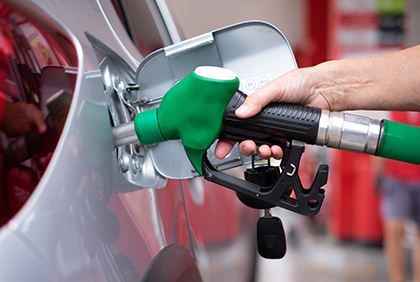INDEPENDENT DEALER
Goliad, TX | (361) 550-9073
OUR BLOG
Want to spend less on fuel? Check out these fuel efficiency tips from Coast to Coast Synthetics in Goliad, TX, to cut costs and drive smarter in 2025.

We’ve all experienced it—the irritation of seeing gas prices rise at the pump. With increasing fuel costs and potential car repairs, it’s easy to feel like your budget is under pressure. But don’t worry, you can take control.
Simple, everyday changes can save you money and gas. From easy maintenance tips to smarter driving habits, these fuel efficiency tips will help you squeeze more miles out of every gallon. Let’s explore a few practical ways to keep your fuel costs down and your wallet happy.
Want superior engine performance? AMSOIL’s synthetic oils are designed to keep your vehicle running at its best. Call Coast to Coast Synthetics in Goliad, TX, at (361) 550-9073 or shop online to stock up on premium car care products!
Keep Your Tank at Half Full
Did you know that keeping your fuel tank at half full can actually improve your car’s efficiency? While it might seem counterintuitive, carrying less fuel reduces the overall weight of your vehicle, which means your engine doesn’t have to work as hard. Additionally, a half-full tank minimizes fuel evaporation, especially in Texas’s hot climate. Plus, it’s a smart safety measure for long road trips, as it reduces strain on the fuel pump. So, next time you’re at the gas station, consider stopping at the halfway mark.
Maintain Tire Pressure
Underinflated tires are a silent fuel economy killer. When your tires aren’t properly inflated, they create more friction with the road, forcing your engine to use more energy to keep the car moving. In fact, maintaining the correct tire pressure can improve your fuel efficiency by up to 3%. Check your tire pressure at least once a month and always follow the manufacturer’s recommended PSI. It’s a quick and easy way to save on fuel and extend the life of your tires.
Drive Smoothly and Avoid Rapid Acceleration
Aggressive driving—like rapid acceleration and hard braking—can drain your fuel tank faster than you think. By driving smoothly and maintaining a steady pace, you can significantly reduce fuel consumption. Anticipate stops ahead of time, ease into acceleration, and avoid sudden braking. Not only will this save you fuel, but it’ll also make your ride safer and more comfortable.
Reduce Aerodynamic Drag
Your car’s aerodynamics play a big role in fuel efficiency. Items like roof racks, cargo boxes, or even open windows can create drag, forcing your engine to work harder. To maximize fuel economy, remove roof racks when they’re not in use and keep your windows up at highway speeds. These small adjustments can help your car glide more efficiently, saving you fuel on every trip.
Use Cruise Control on Highways
Cruise control isn’t just a convenience—it’s a fuel-saving tool. By maintaining a consistent speed, cruise control prevents unnecessary acceleration and keeps your engine’s RPMs steady. This is especially helpful on long stretches of highway, where constant speed adjustments can eat up fuel.
AMSOIL Signature Series 0W-30 keeps your engine running cleaner, smoother, and longer. Pick up a bottle at Coast to Coast Synthetics in Goliad, TX—call (361) 550-9073 now! Stock up on more essentials at AMSOIL’s e-store.
Lighten Your Load
Your car isn’t a storage unit! Carrying around unnecessary weight—like sports equipment, tools, or other heavy items—can hurt your fuel economy. The heavier your vehicle, the more energy it takes to move. Make it a habit to clean out your car regularly, especially before long trips. A lighter load means better mileage and more savings.
Keep Your Car Well-Maintained
Regular maintenance is key to keeping your car running efficiently. Simple tasks like changing your oil, replacing air filters, and tuning up your engine can make a big difference in fuel economy. For even better results, consider using high-quality synthetic oil, which reduces engine friction and improves performance. Stick to your manufacturer’s maintenance schedule to keep your car in top shape.
Choose the Right Driving Speed
Speed matters when it comes to fuel efficiency. Driving at high speeds, especially on highways, can significantly increase fuel consumption. To maximize your mileage, aim to stay at or just below the speed limit. Not only will this save you fuel, but it’ll also keep you safer on the road.
Minimize Idle Time
Idling is a fuel-waster, plain and simple. Whether you’re waiting in traffic or sitting in a drive-thru, turning off your engine when stopped for more than 30 seconds can save you fuel. Modern engines are designed to handle frequent starts, so don’t worry about wearing out your starter. This small habit can add up to big savings over time.